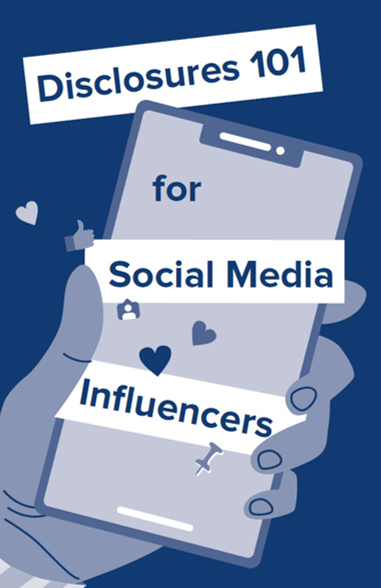Are you an influencer who works with brands to recommend or endorse products or services in social media? Or perhaps you’re an advertiser that uses influencers in your marketing. The FTC just issued a publication you need to know about: Disclosures 101 for Social Media Influencers. And that’s not all. To accompany the brochure, the FTC released a new video to help streamline influencers’ and advertisers’ efforts to stay on the right side of the law.
 The publication is new, but it breaks the compliance message down to the well-established basics. If you endorse a product or service through social media, your endorsement message should make it obvious when you have a relationship – a “material connection” – with the brand. What’s a “material connection”? It could be a personal, family, or employment relationship or a financial relationship – for example, if a brand pays you or gives you free or discounted products.
The publication is new, but it breaks the compliance message down to the well-established basics. If you endorse a product or service through social media, your endorsement message should make it obvious when you have a relationship – a “material connection” – with the brand. What’s a “material connection”? It could be a personal, family, or employment relationship or a financial relationship – for example, if a brand pays you or gives you free or discounted products.
Disclosures 101 for Social Media Influencers discusses when to disclose, how to disclose, and what else influencers need to know. It also answers questions on influencers’ minds:
- How does the disclosure requirement apply in pictures, videos, and live streams?
- What about tags, likes, and pins?
- What kind of wording effectively discloses a material connection?
- What about influencers who post from outside the United States?
- What if a person doesn’t have a relationship with a brand, but is just telling others about a product they bought and happen to like?
- Is it OK to assume a platform’s disclosure tool is good enough? (Spoiler alert: No, that’s not OK.)
How can you use this new resource?
Read the brochure. Disclosures 101 for Social Media Influencers is heavy on the specifics and light on the legal mumbo jumbo. Ten minutes is all it takes for influencers to understand the basics. If you work for an advertiser, PR firm, or agency that works regularly with influencers, get free copies from the FTC bulk order site to share with your team, use it to supplement your training efforts, and then monitor what influencers are doing on your behalf.
Share what you know. Influencers and the brands that use them should want everyone to follow the same established truth-in-advertising standards. Tell your networks about the new publication and talk it up at industry events. Looking for more resources? Visit ftc.gov/influencers.
Watch the video. To go along with the brochure, the FTC has produced a video that explains some compliance fundamentals. Use it as a training refresher.
